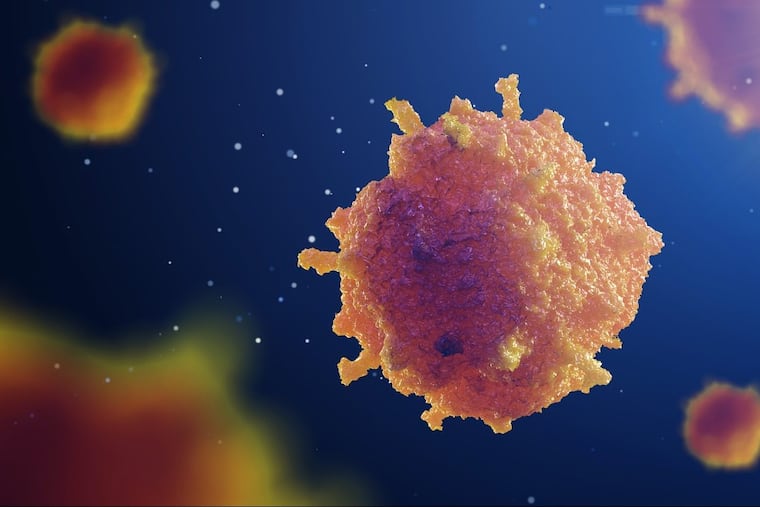Cancer ‘drones’ in blood weaken immune system, Penn scientists show
Cancer's ability to manipulate the immune system — and thereby protect itself — is more sophisticated than previously understood, according to new research published Wednesday in the journal Nature.

Many cancers never happen. Like newborn chicks ousted from the nest, an untold number of fledgling cancers are knocked down by our vigilant immune systems. Those that do mature often succeed by soaring above the body's natural defenses.
But cancer's ability to manipulate the immune system — and thereby protect itself — is more sophisticated than previously understood, according to new research published Wednesday in the journal Nature.
"Tumor cells are smarter than we thought," said Wei Guo, senior author and professor of biology at the University of Pennsylvania. Some spit tiny particles called exosomes into the bloodstream, and some of those can go on to sap the immune system of its cancer-fighting powers, Guo and colleagues showed.
Scientists knew that many cancer cells shut down T cells, the cancer-killing part of the immune system, when T cells drift near tumors. But the newly discovered immunosuppressive particles that act away from the site of a tumor offer a more "systemic view" of how cancer manipulates the body.
These immunosuppressive exosomes "are like drones sent out from the tumor cells," Guo said. Once in the bloodstream, they ambush the immune system. "Even before T cells physically interact with tumor cells, they start wrestling and can get exhausted."
>>READ MORE: Cancer death rate continues to decline amid progress, challenges, researchers report
The team, which included researchers from Penn, the Wistar Institute, MD Anderson Cancer Center, Mayo Clinic, and two universities in China, isolated cancer-derived exosomes from the blood of mice and humans with metastatic melanoma. Each particle is about a hundred times smaller than a red blood cell. Since completing the study, researchers at Penn also report isolating immunosuppressive exosomes from lung, colon, and liver tumors, suggesting these findings may not be unique to skin cancer.
The discovery has implications for immunotherapy, an emerging field of cancer treatment that relies on tweaking the immune system to fight cancer.
Patients in the study were treated with pembrolizumab, an anti-cancer immunotherapy drug designed to stimulate T cells. Less than a third of melanoma patients benefit from this costly treatment, yet little is known about why, explained senior author and Penn pathologist George Xu.
The team found that patients with higher levels of cancer-derived exosomes in their blood before treatment began were less likely to benefit from the drug. Those who did benefit saw their levels of cancer-derived exosomes briefly spike soon after treatment started, a possible early indication that the therapy had successfully activated their T cells.
>>READ MORE: Breakthrough cancer therapy raises tough questions about drug costs, value
A year of treatment with pembrolizumab, an anti-PD-1 antibody, can cost more than $100,000, said Xu. Given the poor response rate, "lots of money has been wasted. But if only after a few treatments we can determine which patients respond to the therapy, then you can imagine how much money we would save." Patients might be shifted to an alternative, more aggressive antibody therapy. Xu and Guo serve as scientific advisers to and have equities in Exo Bio, a start-up seeking to bring these and other discoveries to the clinic.
The findings "expand our concept of cancer biology," said Robert Pierce, a pathologist at the Fred Hutchinson Cancer Research Center who was not involved in the study.
Pierce, whose pioneering work in cancer immunotherapy helped expand pembrolizumab's use in the clinic, noted that exosomes will need to be studied further before they can help clinicians make treatment decisions. Based on the data presented, the potential for misclassifying patients who really would benefit is high, he noted.
Cancer doesn't grow in isolation. Instead, it exploits a "pathologic social network" to survive, said Pierce. The new discovery highlights just how far-reaching that network can be.